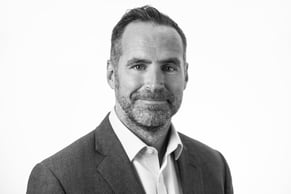
Kevin Cleary, Group COO
What coping mechanisms would you recommend for people experiencing anxiety (in the workplace)?
For people that are experiencing anxiety in the workplace, I would recommend speaking to your peers. It is important to have regular and open communication with both your line manager, team members and others in the workplace. I would also recommend looking at other areas of day-to-day life that could help, such as diet, exercise, planning and sleep, all of which are controllable but often underestimated when thinking about your mental health.
What misconceptions would you associate with Mental Health?
A common misconception associated with mental health is that it is a weakness. Recognising the need to accept help with your mental health requires great strength.
What steps do you take to maintain a healthy work-life balance and avoid burnout?
It’s often easy for work to take over, but the following steps have helped me maintain a healthy work-life approach:
- Diet and exercise: I eat well (but have cheat days!) and regularly go to the gym; exercise and nutrition are so important for maintaining balance and energy.
- Taking time: Allow yourself time to pursue your passions and hobbies outside of work.
- Diary Management: When the diary invitations come in it’s all too easy to press ‘accept, accept, accept. But this can create a fog and rarely results in positive performance. I now actively make sure my diary works for me.
- Boundaries: The latest I aim to go home by is 17:30. I can always log-in and check emails when I am at home if necessary.
- Rest: Adequate sleep is the most important element for me and always will be.

David Robinson, CEO
How do you stay informed about mental health and anxiety management best practices and resources, and how do you apply that to everyday life?
Anxiety is common and I think everyone has dealt with it themselves or knows someone who has dealt with poor mental health. Seeking advice from other people and sharing that advice is so important. I stay informed through my friends, family and my work colleagues. I believe that it is important to have open lines of communication. Since Covid, I have noticed an increase of anxiety in the workplace due to home working and being alone. HR keeps me in informed about what is going on and the best ways to deal with anxiety in the workplace.
What to expect when you start talking about anxiety or your mental health?
I think it is important to create an environment where people can talk openly about their struggles. This doesn’t mean you always have to have the perfect answer, but the simple act of listening can be hugely helpful. And sometimes you can guide people in a direction where they can seek help from a professional and find coping mechanisms that are suited to their needs.
Are there any tools such as apps, books, or activities you could recommend to individuals to help manage anxiety?
Everyone needs to have an outlet. People should take time to do what they enjoy to help instil balance in their everyday lives. I enjoy playing and watching sport, socialising and travelling. It is always good to escape from the everyday routine and see new places, learn new things.

Paula Medcalf, HR Director and Mental Health First Aider
What misconceptions would you associate with Mental Health?
Over the past 5-10 years, our understanding of the issues associated with mental health has improved, especially with our shared experience of the pandemic. I think when we talk about mental health we assume that we are talking about problems or issues. In fact, we all have mental health, whether it be good or bad, and quite often it’s not one or the other. It fluctuates on any given day or week.
I would like people to be more aware of the words that they use – calling people “crazy” or “mental” to mean silly or fun, or even a bit eccentric, still carries a lot of stigma and we need to be a lot kinder in the language that we use every day.
People who are diagnosed with mental health conditions are not all the same – having OCD doesn’t always mean you spend a lot of time cleaning, being schizophrenic doesn’t always mean that you are two-faced or have voices in your head – every condition is unique to the individual, in the range or symptoms and the scale of how it affects their life. It keeps being said but I think it bears repeating - not all of these issues are visible so it’s always worth being kind and courteous as you never know what someone else is going through.
How does sleep affect your Mental Health?
I believe that having good and regular sleep is a massive factor in how we feel every day – if you aren’t sleeping properly then you never have the reserves to cope with what ordinary life can throw at you.
Setting a regular bedtime routine, where you dim the lights and stop using any screens for an hour before you go to bed, so your body knows it’s winding down time. Making sure you go to bed at the same time every night and sleeping in a cooler temperature than the one you’ve been in can all help.
If I have difficulties getting to sleep or getting back to sleep after waking up in the night I use the Headspace meditation app and one of their sleep sound tracks to help me drift back to sleep. Rain on Stones is the one that works for me.
What to expect when you start talking about issues with your mental health and anxiety?
A sense of relief! And the feeling that you’re not alone. Because as soon as you start being open about your struggles it’s amazing how many other people, who you may never suspect are having issues, tell you about what they’ve been through.
Beforehand you feel like you may be judged, but I’ve never felt that has happened, there has just been a greater understanding between friends and colleagues and a feeling of “we’re all in it together”.